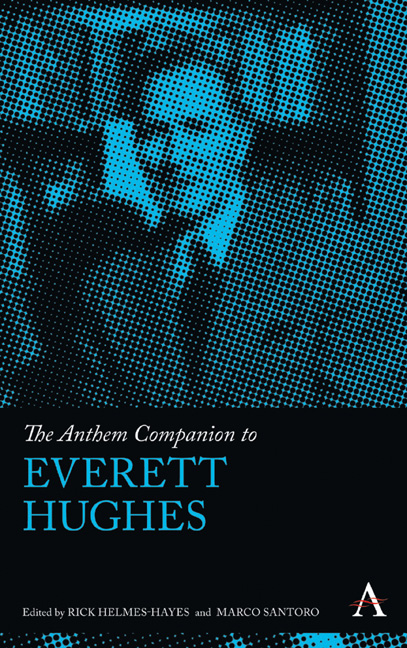Book contents
- Frontmatter
- CONTENTS
- List of Illustrations
- Foreword Everett C. Hughes, Great Teacher
- Insight through Craftsmanship: The Sociological Legacy of Everett Hughes
- Chapter One Everett Hughes and the Chicago Tradition
- Chapter Two Studying “Going Concerns”: Everett C. Hughes on Method
- Chapter Three The Natural History of Everett Cherrington Hughes: A Master of Fieldwork
- Chapter Four Everett C. Hughes: A Key Figure of the Canadian Chicago School Diaspora
- Chapter Five Everett Hughes: Notes from an Apprentice
- Chapter Six An American in Frankfurt: Everett C. Hughes's Unpublished Book on Germans after the End of the Nazi Regime
- Chapter Seven The Origins and Evolution of Everett Hughes's Concept: ‘Master Status’
- Chapter Eight Discovering the Secret of Excellence: Everett Hughes as a Source of Inspiration in Researching Creative Careers
- Chapter Nine Everett Hughes on Race: Wedded to an Antiquated Paradigm
- Notes on Contributors
- Index of Names
- Index of Subjects
Chapter Nine - Everett Hughes on Race: Wedded to an Antiquated Paradigm
Published online by Cambridge University Press: 17 June 2017
- Frontmatter
- CONTENTS
- List of Illustrations
- Foreword Everett C. Hughes, Great Teacher
- Insight through Craftsmanship: The Sociological Legacy of Everett Hughes
- Chapter One Everett Hughes and the Chicago Tradition
- Chapter Two Studying “Going Concerns”: Everett C. Hughes on Method
- Chapter Three The Natural History of Everett Cherrington Hughes: A Master of Fieldwork
- Chapter Four Everett C. Hughes: A Key Figure of the Canadian Chicago School Diaspora
- Chapter Five Everett Hughes: Notes from an Apprentice
- Chapter Six An American in Frankfurt: Everett C. Hughes's Unpublished Book on Germans after the End of the Nazi Regime
- Chapter Seven The Origins and Evolution of Everett Hughes's Concept: ‘Master Status’
- Chapter Eight Discovering the Secret of Excellence: Everett Hughes as a Source of Inspiration in Researching Creative Careers
- Chapter Nine Everett Hughes on Race: Wedded to an Antiquated Paradigm
- Notes on Contributors
- Index of Names
- Index of Subjects
Summary
Thus in effect, on matters of race, the Racial Contract prescribes for its signatories an inverted epistemology, an epistemology of ignorance, a particular pattern of localized and global dysfunctions […] producing the ironic outcome that whites will in general be unable to understand the world they themselves have made.
(Charles W. Mills, The Racial Contract[1977: 18])Everett Cherrington Hughes had his rendezvous with history on 28 August 1963, when he delivered the presidential address at the Annual Meetings of the American Sociological Association (ASA) in Los Angeles. His title was ‘Race Relations and the Sociological Imagination’. The thrust of his peroration was to ask why sociology failed to anticipate the civil rights revolution that had thrown the entire society into crisis. By uncanny coincidence, Hughes’ ASA address occurred on the very same day as the March on Washington, when Martin Luther King Jr. delivered his famous ‘I Have a Dream’ speech.
Here we have a startling contrast of two iconic figures – one an erudite professor, accustomed to the cloistered university that was deliberately walled off from the noise and distraction of the world outside, in this case Chicago’ South Side, one of the nation’ largest ghettos; the other a preacher and activist who led a grass-roots movement by an oppressed people, demanding the elementary civil rights supposedly restored by the Reconstruction amendments at the end of the Civil War and vitiated by the so-called Jim Crow system that were the living legacy of slavery.
Thus it came to be that Hughes and King were thrust onto the stage of history in August 1963. This was a pivotal moment in the history of the civil rights revolution. After a decade of grass-roots protest, the 1964 Civil Rights Act was wending its way through Congress, and it was not clear whether there were enough votes in Congress to break a filibuster by Senate Dixiecrats, who for decades had thwarted even anti-lynching legislation. Leaders of the movement had planned a March on Washington under the banner of ‘For Jobs and Freedom’, despite President John F. Kennedy’ apprehension that the march might kill any chance of getting civil rights bills through Congress. In short, the danger was real that the civil rights revolution would come to naught.
- Type
- Chapter
- Information
- The Anthem Companion to Everett Hughes , pp. 211 - 234Publisher: Anthem PressPrint publication year: 2016

